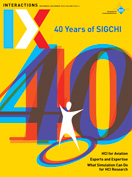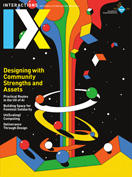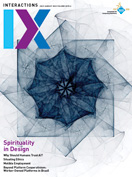Authors:
Matt Jones, Yvonne Rogers
Gary Marsden, professor of computer science at the University of Cape Town, pioneer and passionate advocate of HCI for development and community builder, died suddenly of a heart attack on December 27, 2013, at the age of 43. Disciplinary divisions, bureaucratic firewalls, pomp, and pretension—all were anathema to his playful mind. He cared passionately about his work; impact truly was at the heart of what he did and stood for, whether it was teaching programming to undergraduates, tinkering and DIY projects with rural communities, or walking the talk with top brass in industry.
Gary began his academic career at Stirling University, Scotland. During his final year as an undergraduate, Harold Thimbleby piqued his interest in the seemingly strange—to a self-confessed geeky computer scientist—field of HCI. While being a convert to human-centered computing, Gary had a natural gift for understanding what made a good user experience and the value of participatory design. One of his vacation jobs was as a character actor at a U.S. theme park, where he deftly made paper-boat hats with visitors. He once explained why this summer job made him so happy: It was fun but serious, hands-on, helped people learn, and, importantly, made them laugh. This was Gary's leitmotif throughout his academic life—as anyone who attended his lecture courses, keynotes, and workshops around the world will know.
Gary was awarded a Ph.D. for his thesis on interface tools for end users and took up a lectureship in HCI at Middlesex University, London, in the mid-1990s, where he helped to establish the Interaction Design Centre. He was a research entrepreneur from those early days; it was clear to those around him that he was full of joyful energy and enthusiasm, making connections and seeking out opportunities to make the world a better place. In London he did some of the earliest work on mobile information access, which led to his popular book co-authored with Matt Jones, Mobile Interaction Design.
During his time at Middlesex, Gary was seconded to teach HCI in Cairo for several weeks each year. One night, on returning from class, he joined a table of older academics from around the world, all strangers but brought together through this assignment. One of the guys, cigar and whiskey in hand, looked across the table and said, "Boys, enjoy this, it is as good as it gets!" Gary would later regale others with this story, and with a wry smile and while imitating the guy, one-up him by saying, "The best is yet to come."
After four years of spending his working life inside a metal box with limited windows on the North Circular Road in London, Gary escaped to the open skies and sunshine of South Africa, where he took up a lectureship post in 1999 at the University of Cape Town. While many were going in the opposite direction because of the political events happening at that time, Gary strode forth where others dared not. In just a few years, he had managed to put HCI in South Africa and South Africa in HCI.
Gary became internationally known for his work in mobile interface design, design, and ICT for development (ICT4D)—for which he was a recipient of ACM SIGCHI's Social Impact Award in 2007. He went to great lengths to show how mobile technologies were revolutionizing how developing countries were advancing apace. In doing so, he raised the profile of what developing world actually meant. Most important, he stressed throughout his research, his many hands-on activities, and his writings that those who were privileged like himself should not try to help others who were worse off, but instead should find ways of working alongside them. His approach was to promote empowerment through technology, enabling other people to become better equipped to the point where they could innovate for themselves, and even leapfrog their counterparts in developed countries. Though the communities he engaged with in the townships of Africa and beyond may have had low technical sophistication and lacked the abilities to set up new forms of technology, he was inspired by the ways in which they had appropriated cheap mobile technology.
Gary was a playful, generous, and intelligent spirit who will be sorely missed by all those who were taught by him, worked with him, or simply had met him.
While in South Africa, Gary continued to network, reach out, and enjoy life in other parts of the world. He spent sabbaticals at Microsoft Cambridge and Waikato University in New Zealand, rising to the challenges of being a senior "intern" with much aplomb.
Gary bought a place in Cape Town that had a house for his family and a bungalow where family, friends, and colleagues could stay. He was most generous and hospitable in every way imaginable, welcoming us both to visit for as long as we liked—the same treatment was offered to many others. Gary would drive us around everywhere, proud of his adopted home, Cape Town, showing us the cool, hip, and happening places—from well-known wine farms to lesser-known coffee shops—during which time we would always be plotting and planning new research projects and papers to write. True greatness.
Gary was most passionate about his teaching and would often work into the wee hours marking papers, reading his students' drafts, or thinking up the next set of exam questions. He received many teaching awards, the last one a prestigious award from his university that only a few ever receive. One of the last things he did was to produce with his students a wonderful video about the goals and mission of his internationally renowned lab, ICT4D at UCT (http://youtu.be/xNn2TEBgtfA). It captures Gary to a tee. Watch it, be stirred (but not shaken), and smile. Gary was a playful, generous, and intelligent spirit who will be sorely missed by all those who were taught by him, worked with him, or simply had met him.
Gary is survived by his wife Gil and his two children, Holly and Jake.
Copyright held by authors
The Digital Library is published by the Association for Computing Machinery. Copyright © 2014 ACM, Inc.








Post Comment
@Mac (2014 09 16)
Well done Gary, R.I.P - and Matt and Yvonne for this piece.
@[email protected] (2018 10 26)
Gary, we appreciate & salute the work in the field of digitisation for whole world especially for developing countries. R.I.P. with memories…..
From :-
V K Jha
Sr.Mgr.
RDCIS,SAIL, RANCHI (INDIA)
Email :[email protected]